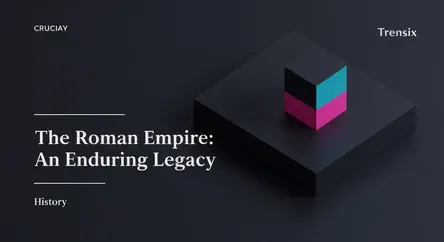History
The Roman Empire: An Enduring Legacy

Explore the Roman Empire, from its rise as a dominant world power to its lasting influence on modern law, language, and culture.
What is it?
The Roman Empire was one of history's most powerful and influential civilizations, originating from the city of Rome. Officially beginning in 27 BCE with Emperor Augustus, it succeeded the Roman Republic. At its peak under Emperor Trajan in 117 CE, it controlled a vast territory stretching from Britain to North Africa and the Middle East, encircling the Mediterranean Sea. Known for its military might, engineering marvels like aqueducts and roads, and complex legal system, the empire enjoyed a long period of stability known as the Pax Romana. The Western Roman Empire fell in 476 CE, but its eastern counterpart, the Byzantine Empire, endured until 1453.
Why is it trending?
The Roman Empire remains a subject of fascination due to its profound and visible impact on the modern world. Its legacy is embedded in Western culture through language, with Latin forming the root of many modern languages. Key government concepts, like the Senate, are Roman in origin, and Roman law forms the basis of many contemporary legal systems. There is also a timeless interest in its dramatic history of power, ambition, and eventual collapse, which serves as both an inspiration and a cautionary tale. Furthermore, philosophical ideas from the era, particularly Stoicism, are experiencing a resurgence in popularity for their teachings on resilience and wisdom.
How does it affect people?
Daily life in the Roman Empire was highly dependent on social status. The majority of people in cities like Rome lived in cramped apartment blocks called 'insulae', which were often unsanitary and poorly built. Wealthy citizens resided in luxurious homes known as a 'domus', often featuring courtyards and fine decorations. A typical workday for a Roman was short, often ending around noon. The afternoons were dedicated to leisure. People from various classes could visit public baths to socialize and relax, or attend free entertainment like gladiatorial games and chariot races, famously summed up by the phrase "bread and circuses."